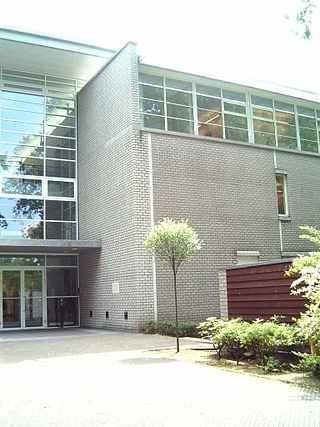
The Max Planck Society for the Advancement of Science is a formally independent non-governmental and non-profit association of German research institutes. Founded in 1911 as the Kaiser Wilhelm Society, it was renamed to the Max Planck Society in 1948 in honor of its former president, theoretical physicist Max Planck. The society is funded by the federal and state governments of Germany.

Gerd Gigerenzer is a German psychologist who has studied the use of bounded rationality and heuristics in decision making. Gigerenzer is director emeritus of the Center for Adaptive Behavior and Cognition (ABC) at the Max Planck Institute for Human Development and director of the Harding Center for Risk Literacy, both in Berlin.
Michael Tomasello is an American developmental and comparative psychologist, as well as a linguist. He is professor of psychology at Duke University.
Stephen C. Levinson FBA is a British social scientist, known for his studies of the relations between culture, language and cognition, and former scientific director of the Language and Cognition department at the Max Planck Institute for Psycholinguistics in Nijmegen, the Netherlands.

The Max Planck Institute for Biological Cybernetics is located in Tübingen, Baden-Württemberg, Germany. It is one of 80 institutes in the Max Planck Society.
The Max Planck Institute of Neurobiology was a research institute of the Max Planck Society located in Martinsried, a suburb of Munich in Germany. It existed between 1984 and 2022 and merged with the Max Planck Institute for Ornithology to the new, joint Max Planck Institute for Biological Intelligence in 2023.

The Max Planck Institute for Human Cognitive and Brain Sciences is located in Leipzig, Germany. The institute was founded in 2004 by a merger between the former Max Planck Institute of Cognitive Neuroscience in Leipzig and the Max Planck Institute for Psychological Research in Munich. It is one of 86 institutes in the Max Planck Society.

The Max Planck Institute for Psycholinguistics is a research institute situated on the campus of Radboud University Nijmegen located in Nijmegen, Gelderland, the Netherlands. The institute was founded in 1980 by Pim Levelt, and is unique for being entirely dedicated to psycholinguistics, and is also one of the few institutes of the Max Planck Society to be located outside Germany. The Nijmegen-based institute currently occupies 2nd position in the Ranking Web of World Research Centers among all Max Planck institutes. It currently employs about 235 people.

Tricia Striano Skoler is the Head of the Independent Research Group on Cultural Ontogeny at the Max Planck Institute for Evolutionary Anthropology in Leipzig, Germany.

Wolfgang Prinz is a German cognitive psychologist. He is the director of the Max Planck Institute for Human Cognitive and Brain Sciences in Leipzig, Germany, and an internationally recognized expert in experimental psychology, cognitive psychology and philosophy of mind. He is the founder of the common coding theory between perception and action that has a significant impact in cognitive neuroscience and social cognition.

Josep Call is a Spanish comparative psychologist specializing in primate cognition.
Peter Max Gollwitzer is a German professor of psychology in the Psychology Department at New York University. His research centers on how goals and plans affect cognition, emotion, and behavior.

Tania Singer is a German psychologist and social neuroscientist and the scientific director of the Max Planck Society's Social Neuroscience Lab in Berlin, Germany. Between 2007 and 2010, she became the inaugural chair of social neuroscience and neuroeconomics at the University of Zurich and was the co-director of the Laboratory for Social and Neural Systems Research in Zurich. Her research focuses on the developmental, neuronal, and hormonal mechanisms underlying human social behavior and social emotions such as compassion and empathy. She is founder and principal investigator of the ReSource project, one of the largest longitudinal studies on the effects of mental training on brain plasticity as well as mental and physical health, co-funded by the European Research Council. She also collaborates with the macro-economist Dennis Snower on research on caring economics. Singer's Caring Economics: Conversations on Altruism and Compassion, Between Scientists, Economists, and the Dalai Lama was published in 2015. She is the daughter of the neuroscientist Wolf Singer.
Princess Gabriele of Oettingen-Oettingen and Oettingen-Spielberg, known professionally as Gabriele Oettingen, is a German academic and psychologist. She is a professor of psychology at New York University and the University of Hamburg. Her research focuses on how people think about the future, and how this impacts cognition, emotion, and behavior.

The UCL Division of Psychology and Language Sciences is a Division within the Faculty of Brain Sciences of University College London (UCL) and is located in London, United Kingdom. The Division offers teaching and training and undertakes research in psychology and communication and allied clinical and basic science. It is the largest university psychology department in England.

Harold Bekkering is a Dutch professor of cognitive psychology at the Donders Institute for Brain, Cognition and Behaviour of the Radboud University Nijmegen. His research has covered many different ways of learning, ranging from basic sensorimotor learning to complex forms of social learning. Lately, he aims to implement knowledge about human learning in educational settings.
Philipp Kanske is a German psychologist and neuroscientist. He is professor at Technische Universität Dresden. His research focuses on the neuronal foundations of emotion, emotion regulation and emotion understanding, as well as their changes in mental disorders. Philipp Kanske is speaker of the Junge Akademie.

Ralph Hertwig is a German psychologist whose work focuses on the psychology of human judgment and decision making. Hertwig is Director of the Center for Adaptive Rationality at the Max Planck Institute for Human Development in Berlin, Germany. He grew up with his brothers Steffen Hertwig and Michael Hertwig in Talheim, Heilbronn.
Jonas Obleser is a German psychologist and neuroscientist.
Malinda Carpenter,Ph.D, FRSE is a professor of developmental psychology at the University of St Andrews, an international researcher specialising in infant and child communications, prosocial behaviour and group reactions, in how people learn to understand others, and building self esteem; her work includes research between ape and human social cognition, and more recently in considering human-robotic communication futures.











